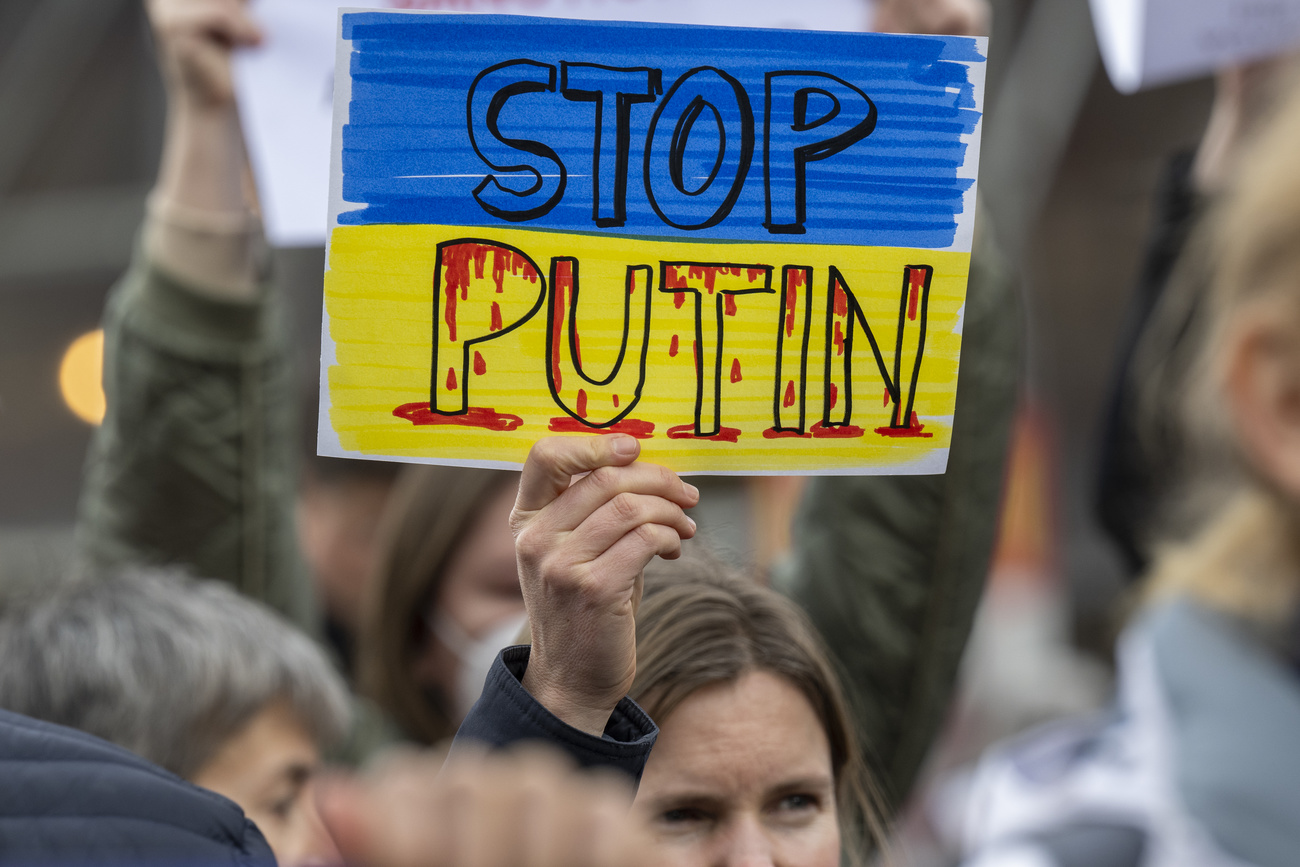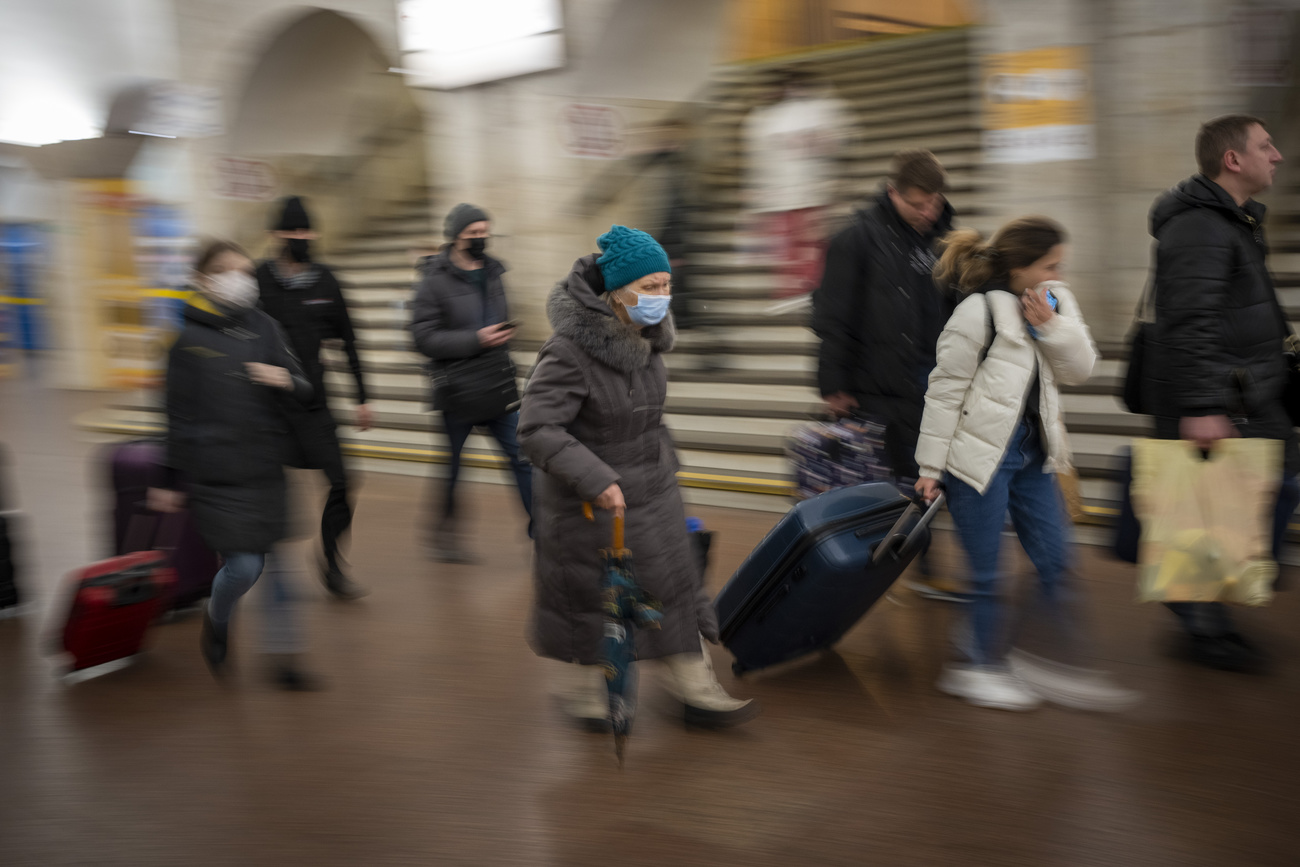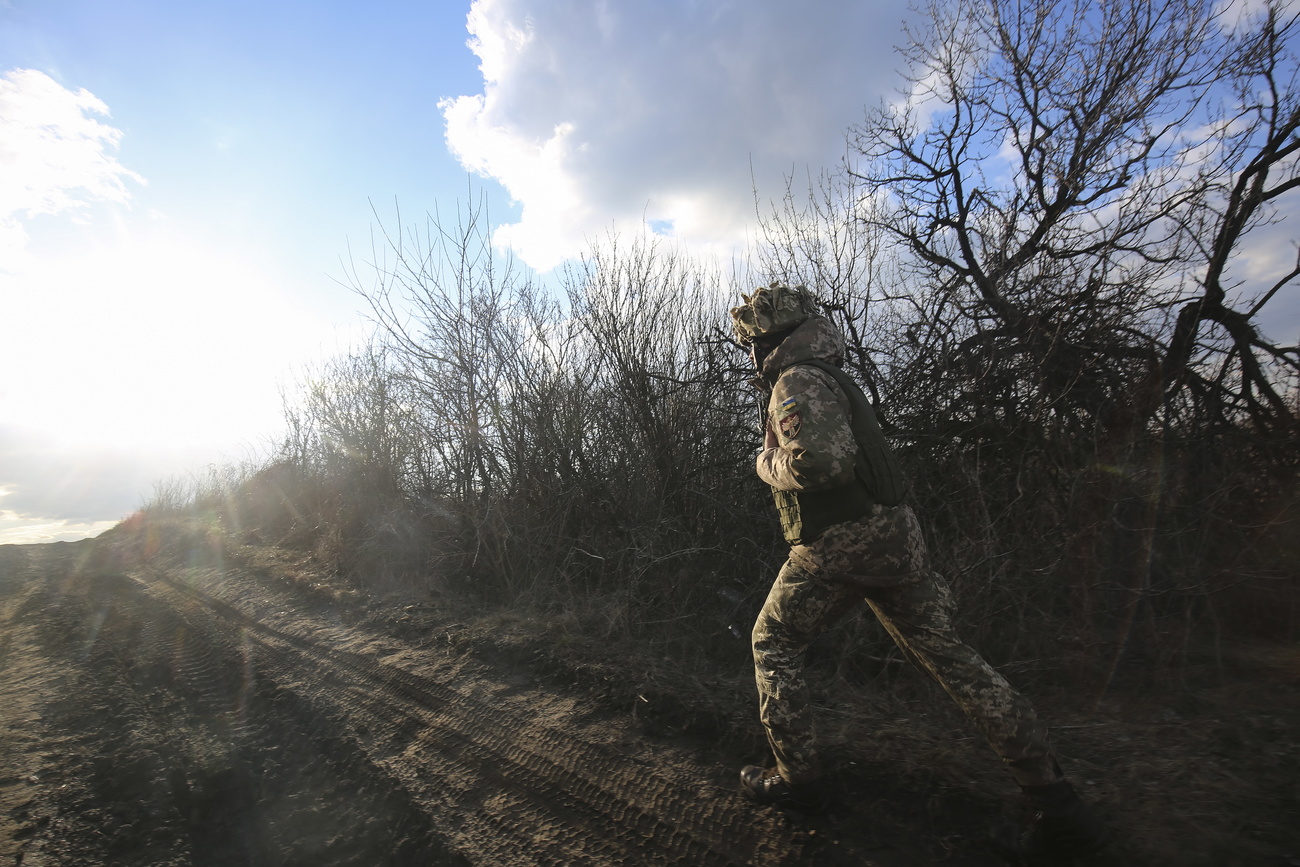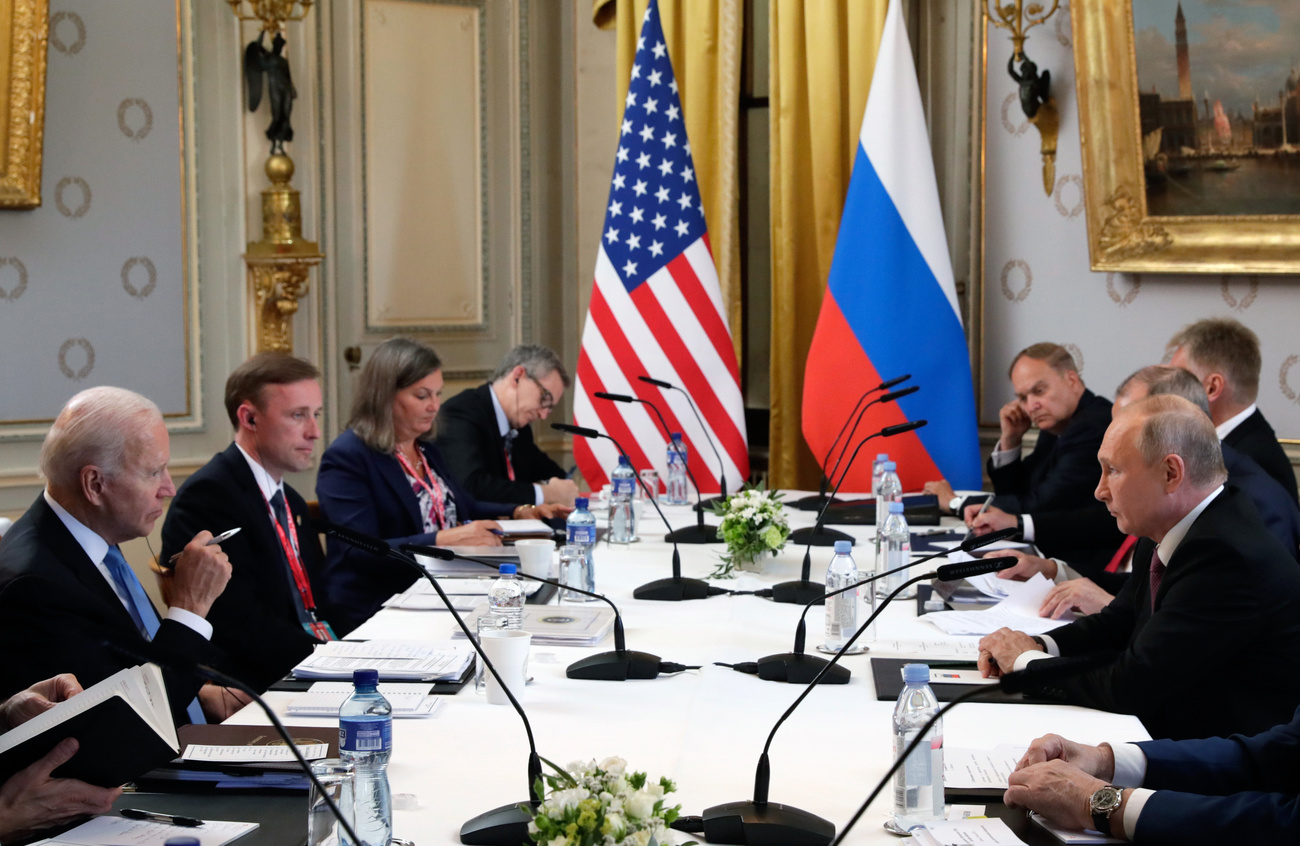Switzerland faces pressure to toughen sanctions on Russia

Neutral Switzerland is resisting pressure both at home and from the European Union to impose tougher sanctions against Russia for invading Ukraine.
On Thursday, Swiss President Ignazio Cassis announced that Switzerland would adopt the same EU travel bans for 367 named Russian individuals and companies. But Switzerland stopped short of freezing financial assets, saying it would instead stop its banks from accepting any more money from those on the sanctions list.
State Secretary Livia Leu justified the move by citing Switzerland’s good offices role and alluded in particular to the protecting power mandate it undertakes between Russia and Georgia. But this is not enough for the EU.
“The civilized, democratic world has to stand up to the biggest threat to European security and stability since the Second World War,” Peter Stano, lead spokesperson for EU external affairs, said on Friday. “It affects not only Ukraine. It affects Europe. Switzerland is part of Europe. So we expect our partner, our neighbour, our ally to follow suit in standing up for defending the principles on which our communities and countries are based.”
EU demands and expects Switzerland and other allies to follow suit with sanctions against Russia. "This is the biggest threat to European security and stability since the end of the Second World War" #UkraineExternal link pic.twitter.com/ufkygYTzL7External link
— Georg von Harrach (@georgvh) February 25, 2022External link
Several political parties in Switzerland are also calling for a firmer stance from the government. The centre-left Social Democrats handed in a petition signed by 20,000 people who also want Switzerland to issue full financial sanctions.
Fighting has been raging in several areas of Ukraine since Thursday morning and Russian forces are reported to be close to the Ukrainian capital of Kyiv.
Switzerland's statement on recent developments in #UkraineExternal link pic.twitter.com/4FhxPxrAyKExternal link
— Swiss MFA (@SwissMFA) February 24, 2022External link
As the EU considers imposing fresh sanctions, Cassis and Economics Minister Guy Parmelin refused to bend on Friday. Cassis fears damaging Switzerland’s potential role in negotiating peace.
“If we were to automatically follow [EU] sanctions, Switzerland could no longer play its traditional diplomatic role with any credibility,” he said.
Switzerland’s statement on recent developments in #RussiaExternal link pic.twitter.com/3E2ck0ahWiExternal link
— Swiss MFA (@SwissMFA) February 25, 2022External link
On Twitter the Ukrainian President Volodymyr Zelensky and jailed Russian opposition figure Alexei Navalny had both called for tough sanctions against Russia.
The European Union, which has already applied sanctions, is considering additional punitive measures. Meanwhile, the United States is urging the West to coordinate sanctions.
Previously, the Swiss government had indicated it wanted to avoid the country being used to circumvent sanctions imposed by the EU. That’s why it was closely studying the measures other states were imposing. The government had followed the same approach when Russia annexed Crimea from Ukraine in 2014.
On Saturday Cassis tweeted that he had spoken to Zelensky and expressed Switzerland’s solidarity with Ukraine and its population “in these dark hours”. He repeated that Switzerland condemned Russian’s “military intervention” in the strongest terms.
Im Telefongespräch mit Präsident @ZelenskyyUaExternal link habe ich unsere Solidarität mit der #UkraineExternal link und der ukrainischen Bevölkerung in diesen dunklen Stunden ausgedrückt. Die Schweiz verurteilt die russische Militärintervention aufs Schärfste. https://t.co/JyG6FGVZHIExternal link
— Ignazio Cassis (@ignaziocassis) February 26, 2022External link
What Switzerland needs to consider
Various factors play a role in the balance of considerations for the Swiss:
Neutrality
Under this principle, Switzerland must maintain a comparably wide distance from two parties in a conflict. However, international law experts agree that this does not apply if, as in the case of Russia, there has been a clear unilateral attack in violation of international law.
A potential role as mediator in the conflict. Switzerland organised a summit between Russian President Vladimir Putin and his American counterpart Joe Biden in Geneva last June and has repeatedly offered its good offices to both countries. Sanctions could jeopardise the Swiss role in diplomacy.
Ukraine Reform Conference
This year Switzerland is organising the annual Ukraine Reform Conference, which focuses on the economic development of the country. It is scheduled to take place in Lugano in July. For Swiss President Ignazio Cassis, it’s a prestige project and an important platform for the Swiss economy – Ukraine is seen as an emerging market. If Switzerland does not show solidarity now, it could upset Ukraine.
Relations with the EU
The relationship between Brussels and Bern has reached an all-time low with the end of negotiations last year on a framework agreement. Switzerland is trying not to cause any more upset with Europe. If the EU goes ahead with tough sanctions, Switzerland will find itself under pressure.
Location for business
Switzerland is home to the headquarters of many commodity firms with strong financial involvement with Russia or that are active in the trade of Russian raw materials, such as oil and gas.
About 80% of Russia’s commodity trading goes through Switzerland, according to the Russian embassy in Bern. Vitol and Trafigura have stakes in a project of Russian oil giant Rosneft and trade in Russian oil, as does commodity trading Gunvor. All three conduct much of their trading activity out of Geneva.
The headquarters of Russia’s controversial Nord Stream 2 pipeline project is also in Switzerland. The project was cleared for sanctions by the U.S. on Wednesday. This gives Switzerland considerable leverage should it decide to use it.
Banking centre
Russian banks are also present in Switzerland. Sberbank and Gazprombank each have a branch here, according to the Russian embassy in Bern. Switzerland is also by far the largest recipient of Russian private capital. Between $5 billion and $10 billion (CHF4.6-9.2 billion) of Russian private money flows into Switzerland every year. These are other potential pressure points that the international community could ask Switzerland to move on.
The Swiss Abroad
There are about 700 Swiss citizens living in Russia. They would have to deal with the fall-out should Switzerland adopt tough sanctions against Russia over its aggression on neighboring Ukraine. The expat population is smaller in Ukraine – only 210. They are now in a war zone.
Reactions in Switzerland
Under the hashtag #StandWithUkraine, many people in Switzerland are expressing their outrage.
“Russia has launched a war of aggression against Ukraine,” Social Democrat parliamentarian Fabian Molina tweeted. “This brutal violation of international law is destroying peace in Europe. Switzerland must stand in full solidarity at the side of our European partners.”
Jon Pult, also a Social Democrat parliamentarian, tweeted: “Putin is waging war on Ukraine and violating the UN Charter. There is no neutrality in the face of such breaches of international law.” Switzerland must support the sanctions, he said, adding that the government’s hesitation is unacceptable. “The oligarchic Putin system should be dried up financially.”
On Thursday, the Swiss press reacted with alarm, calling the Russian invasion of Ukraine a blatant violation of international law and a political turning point for Europe.
“The half-hearted policy of America and Europe towards the tyrant Putin has failed,” wrote the German-language newspaper Neue Zürcher Zeitung. “In view of the danger from Russia for the entire continent, a U-turn is now necessary.”
“The end of the old world has begun,” read the headline in the Tages-Anzeiger. “After this black day, nothing will ever be the same again.”
Putin, the newspaper comments, has lost all empathy, all sense of proportion. “The discussion of tough sanctions seems strangely out of place and helpless, because it makes clear that at the moment nothing can stop the madness,” it said.
But there are also so-called “Putin sympathisers” in Switzerland, ranging from right-wing conservative circles to communists.
Yvette Estermann of the right-wing Swiss People’s Party, for example, told the Aargauer Zeitung establishing a buffer zone between the East and the West makes sense. That buffer would be Ukraine, the Donbass region, so NATO troops are nowhere near the Russian border
Filippo Lombardi, a former senator with the Centre Party who used to head the Switzerland-Russia parliamentary friendship group, told the Aargauer Zeitung: “The West has made at least as many mistakes as Russia.”
Impact on Swiss franc
While stock prices are plummeting, oil and gold prices are rising. Currencies such as the Swiss franc are being sought out as safe havens in these tumultuous times.
Translated from German by Dominique Soguel, Geraldine Wong Sak Hoi

In compliance with the JTI standards
More: SWI swissinfo.ch certified by the Journalism Trust Initiative













You can find an overview of ongoing debates with our journalists here . Please join us!
If you want to start a conversation about a topic raised in this article or want to report factual errors, email us at english@swissinfo.ch.